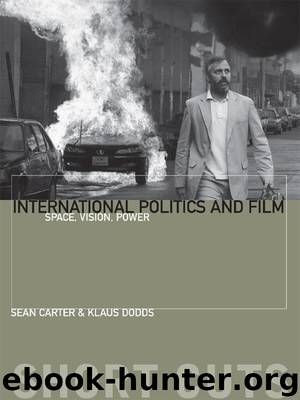International Politics and Film by Sean Carter

Author:Sean Carter
Language: eng
Format: epub
Tags: PER004030, Performing Arts/Film & Video/History & Criticism, POL011000, Political Science/International Relations/General
Publisher: Columbia University Press
Published: 2014-05-13T16:00:00+00:00
Visualising Spaces of Exception
Amongst critical scholars, Agamben’s corpus of work has been widely judged to be insightful in the ways in which it draws attention to how extraordinary powers work in a variety of geographical spaces, and in ways that are both hidden and visible. The films in question here help us consider some of the topographies of extraordinary power and the corresponding states of exception. The films discussed have brought to attention the different ways in which the exceptional materialises in particular places with very different kinds of consequences. For, as we have argued elsewhere, ‘whilst it is possible to conceive of the “battlefronts” of the War on Terror as “de-territorialised”, such an understanding must also retain an appreciation of the ways in which forms of violence and state power are nevertheless spatialised, and produce distinctive cartographies’ (Carter and Dodds 2011: 107). Even if it does not precisely name them, a film like Rendition nevertheless works towards making such places and spaces of exception visible within the geopolitical imagination.
Moreover, given the very form of cinema itself, a form that, to varying degrees relies upon the principles of montage, films such as Rendition can help us to think about the relations and connections between various spaces that make up these distinctive cartographies of detention and torture (or, in the words of Derek Gregory (2006) the ‘carceral archipelago’ and the ‘global war prison’). Furthermore, what Rendition, and other recent US films that broadly take the ‘War on Terror’ as their subject matter (for example The Kingdom and Lions for Lambs (2007)) are also able to do is to create visual connections between the carceral archipelago ‘out there’, and the everyday domestic and political spaces ‘within’ the West. There are, then, political possibilities within these kinds of films that can work to help dismantle binaries between the domestic and international affairs, and the indifference of Western policies towards actions being taken in their name. However, if these films chart and trace complex and ambiguous cartographies of violence and power, then as they do so they also produce their own complex and ambiguous politics, as we discuss further below.
Whilst the state of exception is, both visible and hidden, it is also highly regulated and yet, at critical moments, unrestrained. In Rendition, the exceptional is used as a form of displacement – a form of outsourcing and indicative of a new international division of counter-terror labour. While torture is shown to be ineffective, the film does not really question the practice of rendition more generally. In The Siege the state of exception provides an opportunity for restoration of constitutional values and practices after a senior army officer kills a terrorist suspect. In Iron Man, the state of exception proves to be redemptive for an industrialist at the heart of the military-industrial complex and for the US military more generally. The superhero is able to use his exceptional powers, and lack of state-sanctioned oversight, in order to try and protect vulnerable Afghan communities.
Whilst each of
Download
This site does not store any files on its server. We only index and link to content provided by other sites. Please contact the content providers to delete copyright contents if any and email us, we'll remove relevant links or contents immediately.
Call Me by Your Name by André Aciman(20517)
Ready Player One by Cline Ernest(14677)
How to Be a Bawse: A Guide to Conquering Life by Lilly Singh(7486)
Wiseguy by Nicholas Pileggi(5787)
The Kite Runner by Khaled Hosseini(5180)
On Writing A Memoir of the Craft by Stephen King(4944)
Audition by Ryu Murakami(4932)
The Crown by Robert Lacey(4817)
Call me by your name by Andre Aciman(4688)
Gerald's Game by Stephen King(4654)
Harry Potter and the Cursed Child: The Journey by Harry Potter Theatrical Productions(4507)
Dialogue by Robert McKee(4405)
The Perils of Being Moderately Famous by Soha Ali Khan(4220)
Dynamic Alignment Through Imagery by Eric Franklin(4217)
Apollo 8 by Jeffrey Kluger(3709)
The Inner Game of Tennis by W. Timothy Gallwey(3687)
Seriously... I'm Kidding by Ellen DeGeneres(3634)
How to be Champion: My Autobiography by Sarah Millican(3593)
Darker by E L James(3520)
